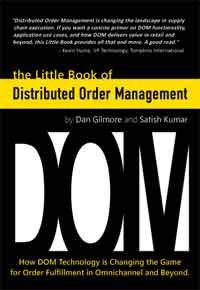The 2020 Election and the Supply Chain
I try for what I hope are obvious reasons to stay apolitical on the pages of SCDigest, but that doesn't mean I can't report on the intersection of politics, business and the supply chain.
It seems certain now we will have a new president in Joe Biden, but from there it gets interesting. Contrary to most predictions, Repubcans actually picked up at least six seats and possibly a few more in the House, making the Democrat's margin there thin.
| GILMORE SAYS: |
CIt is reported that he plans to work with US allies on a common approach toward China, but it is unclear whether he would keep the tariffs or reduce or eliminate them.
WHAT DO YOU SAY?
Send us your
Feedback here
|
But of course the real action is in the Senate, where unbelievably there will be two run-off elections in early January for the two Senate seats in Georgia. Put simply, if Republicans win at least one of the two, they maintain Senate control. Lose both and we're tied 50-50, with future vice president Kamala Harris breaking deadlocks with her vote.
If Republican maintain control, it will severely limit the Biden agenda, from legislation to cabinet and judicial picks. If they lose both, for at least two years Biden will be relatively unconstrained - just how aggressive/progressive that turns out to be will be the question.
Below, I am going to report on likely changes if Democrats grab the Senate along several keys vectors.
Taxes: These will certainly go up, though Biden promised on the campaign that individual taxes will only go up for those making $400,000 or more. We'll see. Taxes on business, cut significantly by Trump, are surely heading higher, how much is the question. This will have some impact on US manufacturing competitiveness and offshoring decisions.
Labor Policy: Here we are likely to see significant, game-changing policies, some of which can be done by executive order regardless of what happens in the Senate. After several decades of decline, unionism may come back in style.
Biden has endorsed the Protecting the Right to Organize Act, which the House passed in February 2020. The Pro Act would nullify all state right-to-work laws, which protect individuals from having to join a union or pay dues. Currently 27 states have right-to-work laws, with several new members in recent years. Such a law would also to an extent reduce the advantage of Southern states, which are almost all right-to-work, in attracting domestic and foreign manufacturing investments.
Equally if not even more consequentially, the Pro Act would also make national law the so-called "ABC test" to determine if a worker can be classified as a contract employee. Without going into all the detail, the ABC test makes it extremely difficult for a contractor to keep that status, and would move millions of workers - from independent truck drivers to freelance writers - to full employee status.
What the full impact of that change would be is far from clear. California passed such a law in early 2020 - but last week, Golden state voters approved a proposition that exempts Uber and Lyft drivers from the rules - after both ridesharing firms threatened to leave the state if the law was maintained.
If this becomes US law, the whole notion of contract truck drivers could be eliminated, among many other changes.
Finally, the Pro Act also requires employers to share their workers' personal information (including emails and cell numbers) with union organizers, even without a worker's consent, which unions would use to promote organization.
 Biden has also said he is in favor of the so-called "microwave" election rule, which reduces the notice period for unionization elections, significantly reducing the time companies have to contest organization with workers, an Obama administration rule that Trump pulled back. Biden has also said he is in favor of the so-called "microwave" election rule, which reduces the notice period for unionization elections, significantly reducing the time companies have to contest organization with workers, an Obama administration rule that Trump pulled back.
There's more, but it's clear passage of the Pro Act would dramatically alter the labor landscape in favor of labor and unions.
Climate and Energy: Biden calls climate change an urgent crisis - and has proposed a very aggressive climate agenda.
Biden would re-enter the US into the 2015 Paris climate accord - after Trump pulled the country out of the UN-led agreement early in his presidency. He has also pledged to set a goal to eliminate US greenhouse-gas emissions by 2050, with the power sector to be free of emissions by 2035.
Biden also calls for "carbon adjustment fees" - a form of tariff - and quotas on imports from nations that don't meet targets for CO2 emissions.
The president-elect says he would also push for accelerated mass adoption of electric vehicles of all sorts. That would include big rebates for swapping into electric, hybrid or hydrogen fuel cell cars - and possibly trucks.
"It's a whole new game in terms of climate in American politics," Daniel Yergin, a historian of the energy industry, said of Biden's plan.
Will a Biden administration ban fracking, which has caused US oil production to soar and brought near energy independence? Late in the campaign he said no, but there will be heavy pressure from the left to do so.
A likely approach - not an outright ban, but heavy regulations that make fracking for oil a lot harder and more expensive, eventually achieving the same ends.
Trade Policy: This is perhaps the most interesting category of all, because it's not clear how different Biden's actual policies would differ from Trump's despite all the campaign jawboning.
For example, like Trump, Biden has said he backs tax incentives to encourage domestic manufacturing.
Biden would of course inherits tariffs on roughly three-quarters on all Chinese exports to US.
It is reported that he plans to work with US allies on a common approach toward China, but it is unclear whether he would keep the tariffs or reduce or eliminate them.
Biden has also raised the idea of joining a renegotiated trade pact among 11 Pacific Rim nations, once called the Trans-Pacific Partnership, which Trump scrapped on his first working day in office.
"Biden will strike a more constructive tone on trade, but in effect he won't be that dissimilar to Trump," says David French, head of government relations for the National Retail Federation.'
Infrastructure: It seems likely a new infrastructure bill - promised often but not delivered by Trump - will be passed sometime soon by Congress and signed by Biden, likely as part of an overall economic stimulus program. It is possible though that happens before Trump leaves office. The size of the plan is likely to be significantly impacted by which controls the Senate at the time.
So I think I will end it here. I would be pleased with your reaction to me thought anything you think I missed.
Any reaction to Gilmore's thoughts on the election and the supply chain? Let us know your thoughts at the Feedback section below.
|









 Biden has also said he is in favor of the so-called "microwave" election rule, which reduces the notice period for unionization elections, significantly reducing the time companies have to contest organization with workers, an Obama administration rule that Trump pulled back.
Biden has also said he is in favor of the so-called "microwave" election rule, which reduces the notice period for unionization elections, significantly reducing the time companies have to contest organization with workers, an Obama administration rule that Trump pulled back.

